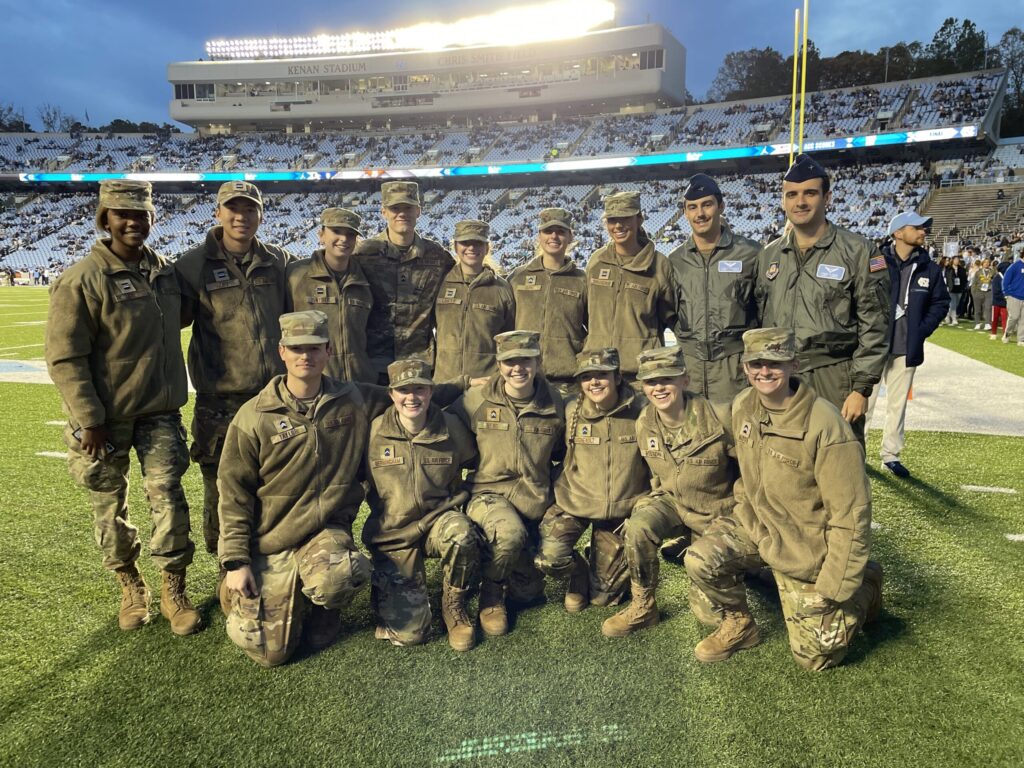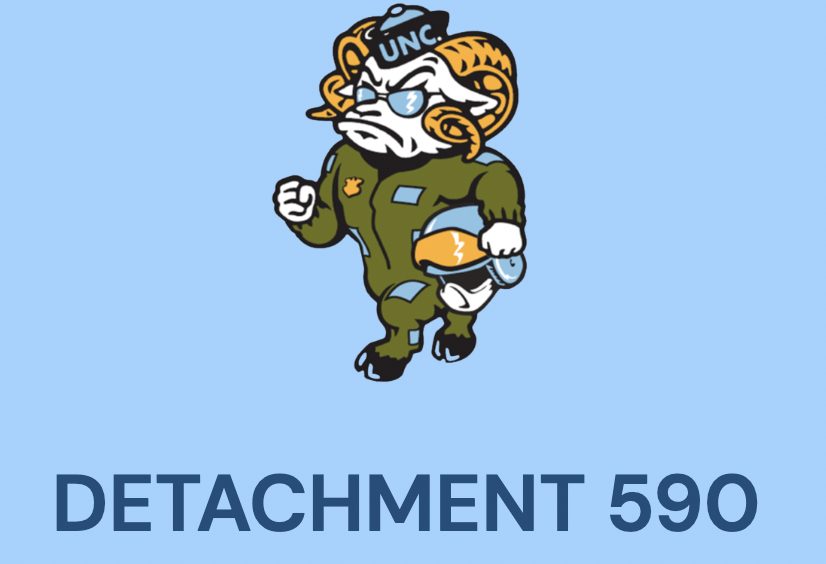
Air Force ROTC (Reserve Officers’ Training Corps) is a program designed to prepare students for leadership roles in the United States Air Force while earning a college degree. Offered at over 1,700 colleges and universities across the United States, AFROTC teaches students about leadership, management, public speaking, the history of air power, the role of the military in today’s society, and more.
AFROTC is not a major; cadets take ROTC courses in addition to the courses in their chosen major. ROTC training (also known as mandatory PMT, Practical Military Training) is designed at a national level to not exceed 5 hours per week. These hours are broken down as follows:
Leadership Laboratory (LLAB)
Thursdays, 8:30am to 10:30am
LLABs are instructive sessions designed and implemented fully by juniors and seniors in the program, with oversight by Cadre. Activities include marching, group leadership projects, teamwork-building exercises, expeditionary training, career exploration, and public speaking practice, intended to hone critical thinking, situational awareness, and decision-making under pressure.
Physical Training (PT)
Tuesdays and Thursdays, 6:00am to 7:00am
While the rest of the campus sleeps, Det 590 cadets are up bright and early getting their workouts in. Fitness is an integral part of training to become an Air Force Officer. At Det 590, we know our cadets have strengths in different areas and the intensity of our training plans is able to cater to and challenge everyone. Our cadets excel at the Physical Fitness Assessment, a test consisting of push-ups, sit-ups, and a 1.5 mile run, which is used as a factor in various selection processes. PT serves a greater purpose, though: morale. It is a great opportunity for bonding and releasing stress through physical activity.
Aerospace Studies Classes
Tuesdays, time dependent on academic year
A Cadre member instructs these classes. Our Cadre are active duty officers and enlisted members who serve as leaders, teachers, and mentors to our cadets. They help cadets succeed both in AFROTC and understanding what life is like in the “Big Air Force”. In class, cadets learn about the Air Force mission, heritage, capabilities, and careers, as well as explore leadership styles and national defense strategies. Regardless of their major, Det 590 cadets also graduate with a minor in Aerospace Studies.
Year-by-Year Progression
The first two years of the program are referred to as the General Military Course (GMC) and are designed to introduce the cadet/student to the Air Force and the broad opportunities offered. With this information, a student can make an informed decision on whether the Air Force interests him or her. A student may enter, or leave, Air Force ROTC at any point while in the GMC unless obligated by scholarship.
The second two years are referred to as the Professional Officer Course (POC) and are designed to prepare an officer candidate to become a commissioned officer (Second Lieutenant) in the United States Air Force. Entry into the POC is competitive.
The minimum requirement for entry into the program is to be a full-time student at the University. Minimum requirements for consideration to enter the last two years of the program include a 2.5 GPA, U.S. citizenship, medical qualification, passing a physical fitness test, and achieving minimum scores on the Air Force Officer’s Qualification Test (AFOQT).
It is possible to complete a three-year program if you did not begin as a first-year student. Contact our Recruiting Officer for more information at (919) 962-2074 or afrotc@unc.edu

General Military Course (GMC)
AS100 (freshmen) and AS200 (sophomore) cadets follow the General Military Course (GMC). The curriculum is designed to improve communication skills and provide a window into military life. Cadets are focused on learning customs and courtesies, military bearing, and expectations of the program. It’s an opportunity for students to try out the program with no obligation (for those not on an ROTC scholarship).
Field Training
During the summer after your sophomore year, cadets participate in an approximately 17-day field training experience at Maxwell Air Force Base, Alabama. It is required for all cadets who wish to continue into the Professional Officer Course. This rigorous event involves physical conditioning, weapons and survival training, drill and ceremonies, and lots of Air Force career exposure. It is the culmination event of the GMC years and cadets have an opportunity to learn from ROTC participants from all over the country and be evaluated on their leadership skills. Training from PMT events weighs heavily into cadet performance during this time period, and Det 590 cadets continuously report that they felt well-prepared for the challenges of Field Training.
Professional Officer Course (POC)
After completing Field Training, cadets follow the Professional Officer Course. AS300s (juniors) and AS400s (seniors) are collectively referred to as the POC. Their focus shifts from receiving training to planning and delivering it. The POC are in charge of the Cadet Wing and serve in leadership positions from Cadet Flight Commander to Wing Commander. The Professional Officer Course is designed to hone cadets’ leadership style, improve their understanding of warfare, and prepare them for active duty. At the beginning of AS300 year, cadets typically rank their career preferences. AS400s are in the home stretch of AFROTC, and often hold the highest-ranking positions in the Cadet Wing and impart the lessons they have learned to younger cadets. There is much to celebrate during this year as cadets find out their career (or AFSC, Air Force Specialty Code), first base assignment, and commission. The commissioning ceremony is held around graduation time; after this event, you are longer a cadet, you are a Second Lieutenant in the United States Air Force.
